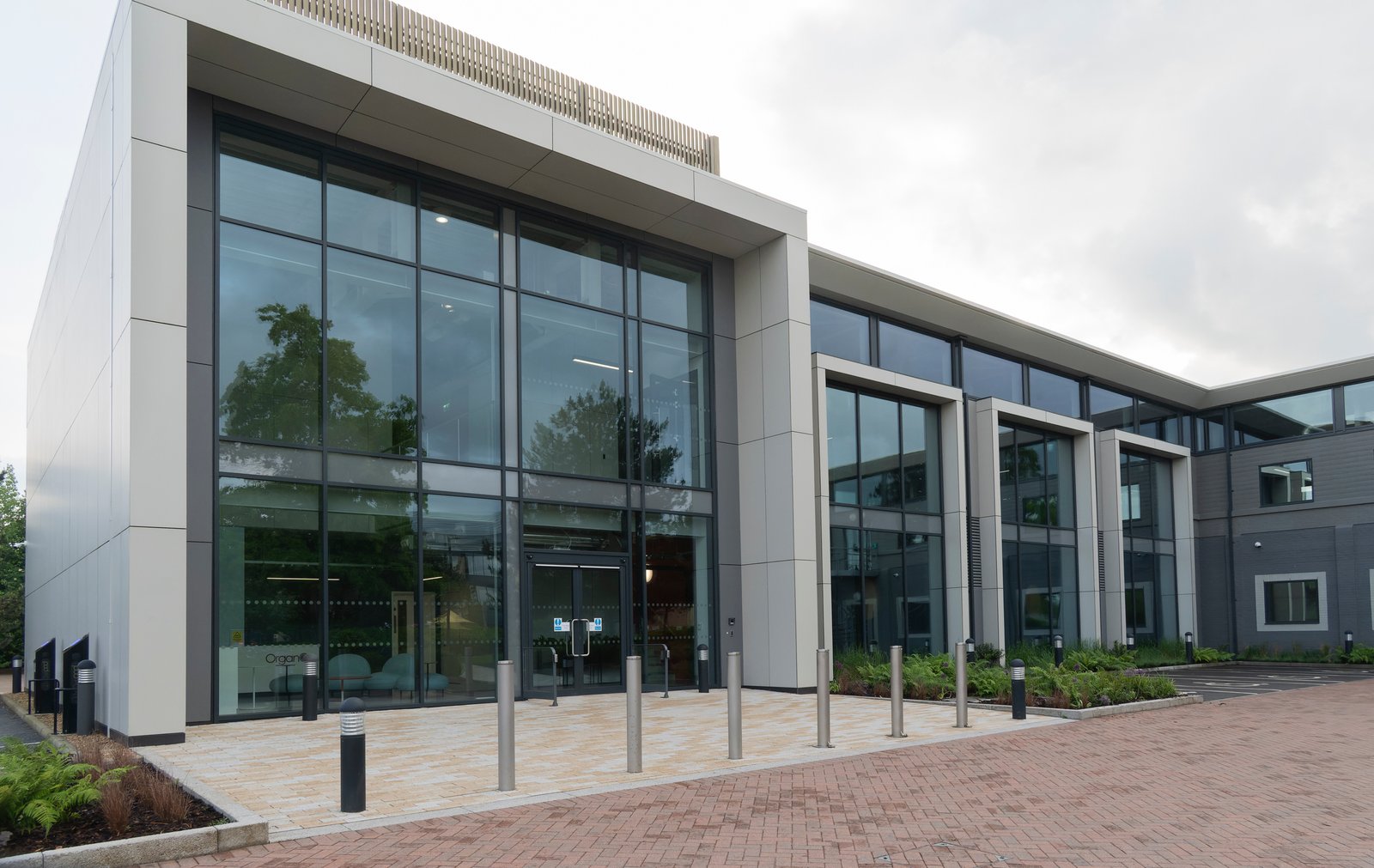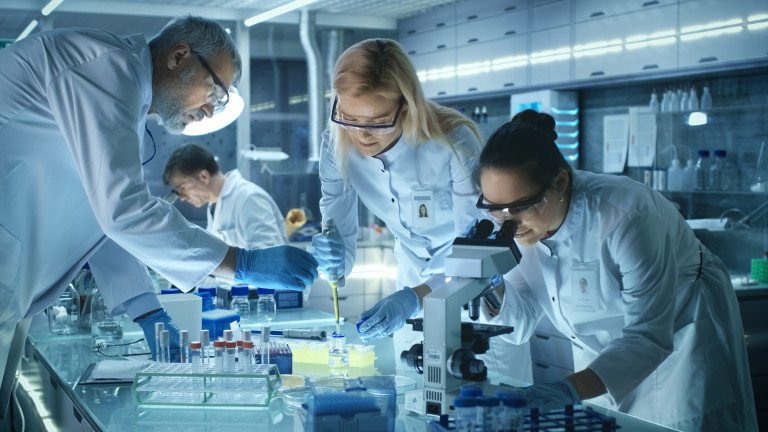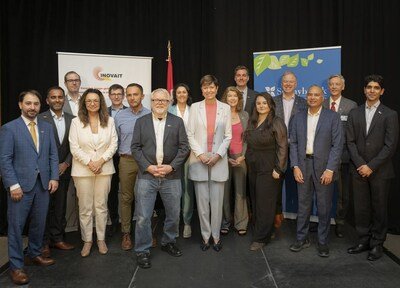
OrganOx Ltd, a world-leading medical technology company developing innovative solutions for organ preservation prior to transplantation, and for the treatment of acute organ failure, is proud to announce the official opening of a new 18,000 square-foot global research, development, and production headquarters in Oxford, UK. Originally spun out from the University of Oxford in 2008, OrganOx developed the world’s first normothermic liver perfusion device, the metra®. The metra® launched across Europe in 2018 and in the U.S. in 2022 and has gained rapid market adoption since, enabling more organ transplants, eradicating night-time operating, and improving patient outcomes.
“Our new facility opening is a major milestone, providing OrganOx stakeholders access to world-class facilities and technologies as we work together in ways that were simply not possible previously,” said Craig Marshall, CEO. “We are proud to be a growing member of the Oxford business and scientific community, and I am greatly looking forward to broader collaborations with commercial and clinical partners.”
Prof. Peter Friend, FMedSci, Chief Medical Officer, and Co-Founder of OrganOx, commented, “We are all excited about what the future holds for OrganOx as we continue to push the scientific and clinical boundaries with technology-based solutions designed to improve the lives of patients experiencing acute or chronic organ failure. This remarkable new facility will support us in that mission for many years to come.”
“Peter and I, surgeon and engineer, could scarcely imagine a day like this when we first began collaborating in an Oxford University laboratory more than 20 years ago,” said Prof. Constantin Coussios, OBE FREng FMedSci, Chief Technology Officer, and Co-Founder of OrganOx. “It is truly remarkable and a testament to the dedication and efforts of a great many researchers, engineers, transplant surgeons, staff, customers, patients, and business partners, whom we celebrate on this occasion.”
Write comment (0 Comments)
Novo Nordisk announced plans to invest 4.1 billion US dollars to build a second fill and finishing manufacturing facility in Clayton, North Carolina, and grow its ability to produce current and future injectable treatments for people with obesity and other serious chronic diseases.
Marking one of the largest manufacturing investments in Novo Nordisk’s history, the expansion will add 1.4 million square feet of production space for aseptic manufacturing and finished production processes, doubling the combined square footage of all three of the company’s existing facilities in North Carolina. It will also add 1,000 new jobs, besides the nearly 2,500 Novo Nordisk employees already working in the region, a central hub for innovation and biotechnology in the United States.
“It took us a century to reach 40 million patients, but through this expansion and continued investment in our global production, we’re building Novo Nordisk’s ability to serve millions more people living with serious chronic diseases in the future,” said Lars Fruergaard Jørgensen, president and CEO of Novo Nordisk. “This is yet another real signal of our efforts to scale up our production to meet the growing global need for our life-changing medicines and the patients of tomorrow.”
Utilising state-of-the-art technology, roof-top solar panels and innovative water strategies, the facility is designed in an efficient and environmentally sustainable way to deliver the highest-quality products to patients around the world. The goal is to obtain LEED Gold certification, recognised as a standard of excellence in constructing healthy, efficient, carbon and cost-saving green buildings.
“Clayton was the first manufacturing site for Novo Nordisk in the US, and this new, large-scale investment confirms the continued importance of our production facilities there as cornerstones of our company’s growth,” said Henrik Wulff, executive vice president, Product Supply, Quality & IT, Novo Nordisk. “For decades, we have partnered to foster a well-trained, dedicated and diverse local workforce in North Carolina. In Clayton and across our global manufacturing sites, we are driven by one purpose: to deliver more for the millions of people living with chronic diseases – and this facility will help us achieve just that.”
Early clearing and foundational work are already underway to prepare the 56-acre facility footprint. Construction will gradually be finalized between 2027 and 2029. Around 2,000 external contractors will be engaged at the height of the project.
“It’s a historic day for Johnston County,” said Butch Lawter, Chair of the Johnston County Board of Commissioners, who, during today’s press conference, announced county grants to further support the expansion project. “Thirty-one years ago, Novo Nordisk decided to make a new home here in Clayton. Then, in 2016, they announced a new facility right across the street - the single largest life sciences investment on state record at the time. Today, they’re breaking that record again… with a third facility, 1,000 new jobs and a vote of confidence in the partnerships we have forged in the community over the decades.”
In 2024, Novo Nordisk will increase actual investments in production and plans to invest approx USD 6.8 billion (DKK 45 billion) in production compared to actual investments of USD 3.9 (DKK 26 billion) last year* to increase supply.

Pall Corporation, a leader in filtration, separation and purification technologies, held its opening ceremony for a new state-of-the-art manufacturing facility in Singapore that will serve regional and global customers within the growing semiconductor industry. Pall has invested approximately US$150 million on the facility which will primarily produce lithography and wet-etch filtration, purification and separation solutions that will help meet the high demand for advanced node semiconductor chips.
“Throughout an almost 80-year history, Pall has been on the forefront of solving some of the world’s most complex challenges using advanced filtration. This new facility is not only an important development for advancing semiconductor manufacturing technology, but also an important next step for Pall. We will continue to leverage our experience and expertise to help solve global challenges, from the increased demand for advanced chips to aiding in the transition to greener manufacturing,” said Mr. Naresh Narasimhan, Danaher Group Executive, High Growth Markets & Pall Corporation.
The now-completed seven-acre facility will include more than 18,000 square meters of high-volume manufacturing (HVM) and office space and will integrate core research and development capabilities in the future. The new facility will allow customers in highly demanding industries to meet growing end market demand for data processing and storage.
“Newer applications like generative artificial intelligence (AI), high-performance computing (HPC), next generation communications and autonomous vehicles require cutting-edge semiconductor chips that are made in advanced node fabs. The high technology filtration solutions manufactured by this new facility are specifically designed to support the production of these advanced node logic and memory chips,” said Mr. Shangaza Dasent, Vice President and General Manager Microelectronics, Pall Corporation.
It is expected that the new site will create up to 300 jobs over the next few years across science, engineering and advanced manufacturing, with an emphasis on training and developing new talent as well as enabling transfer of knowledge to contribute to the growth of the sector as part of Singapore’s long-term strategy. There will be a consistent focus on talent development aligned to broader strategic national priorities to ensure that the advanced manufacturing industry can thrive in Singapore. With the addition of Pall’s new facility, Pall is building more capacity to support cutting-edge technologies and help scale new applications like generative AI.
“We warmly welcome Pall’s new manufacturing facility to Singapore’s vibrant semiconductor ecosystem. This addition not only strengthens Singapore’s position as a critical node within the global semiconductor industry, but also improves the resiliency of the supply chain for the region. Singapore is committed to nurturing talent, building our R&D capabilities and ecosystem, and working with the industry to build a robust and diverse advanced manufacturing cluster,” said Mr. Tan Kong Hwee, Executive Vice President, Singapore Economic Development Board.
Mr. Alvin Tan, Minister of State for Trade and Industry and Culture, Community and Youth, graced the opening ceremony as Guest of Honor and was joined by Casey Mace, Deputy Chief of Mission, U.S. Embassy in Singapore and Tan Kong Wee, Executive Vice President, Economic Development Board.
Write comment (0 Comments)
The PPD clinical research business of Thermo Fisher Scientific Inc., the world leader in serving science, unveiled a new clinical research laboratory building at its good manufacturing practices (GMP) lab in Middleton, Wisconsin. The new 72,500-square-foot building increases the site’s chemistry, manufacturing and control (CMC) analytical capabilities as part of its clinical development and laboratory services focused on improving health by helping customers deliver life-changing medicines.
“As research in biopharmaceutical therapies continues to rapidly expand, we are excited to expand our overall capacity and capabilities in laboratory services to help our customers deliver therapies that meet the highest quality and safety standards for patients,” said Leon Wyszkowski, president, analytical services, clinical research, Thermo Fisher Scientific. “We will continue to support and empower our customers as they continue to discover, develop and deliver new groundbreaking therapies. This $58 million investment to expand the site is a testament to our dedication in supporting Thermo Fisher’s Mission of making the world healthier, cleaner and safer.”
The GMP site offers high-quality analytical services for small molecules and biologics, including biopharmaceuticals, inhaled pharmaceuticals and device testing, cell and gene therapy, protein characterization and mass spectrometry analysis for all phases of drug development. The latest addition to the GMP campus provides a multi-use and flexible biosafety level 2 laboratory that includes a purpose-built liquid chromatography-mass spectrometry and protein characterization space, two large molecular suites with access controlled pre- and post-amplification labs, and two large general-use labs. The expansion will add up to 350 scientists and laboratory support professionals to the almost 2,300 employees working across the research campus.
Earlier this year, Thermo Fisher announced the addition of biosafety testing to its GMP portfolio of services at the Middleton facility. With the addition of this capability, as well as the addition of the new building, the site offers a full complement of end-to-end laboratory services.
“As Wisconsin’s biohealth sector continues to grow, so will our workforce, our economic momentum, and our opportunities to build a healthier, stronger state for all,” said Gov. Tony Evers. “This new state-of-the-art facility will not only further advance our state’s biosafety testing capabilities and create hundreds of jobs, but it will also help protect consumers and improve patient health outcomes across the state.”
In addition to GMP and bioanalytical labs in Middleton, Thermo Fisher’s clinical research laboratory business includes bioanalytical, biomarker and vaccine sciences labs in Richmond, Virginia; a GMP lab in Athlone, Ireland; central labs and biomarker operations in Brussels, Belgium, Highland Heights, Kentucky, and Singapore; and bioanalytical, biomarker, vaccine sciences and central labs in Suzhou, China.
Write comment (0 Comments)
INOVAIT and the Government of Canada announced a $10.7 million investment in contributions to seven commercialization-focused R&D projects under the second iteration of INOVAIT's Focus Fund program.
Founded by the Sunnybrook Research Institute (SRI) and supported by the Government of Canada's Strategic Innovation Fund (SIF), INOVAIT is Canada's network focused on advancing image-guided therapy (IGT) through the integration of artificial intelligence (AI), big data, and machine learning. IGT is the practice of using medical imaging to plan, perform, and evaluate medical interventions. The INOVAIT network supports Canadian innovators who are unleashing the power of AI through IGT's precision therapy and treatment to streamline healthcare and improve healthcare outcomes.
"Canada has tremendous strength in the research and development of medical imaging and AI technologies. We need to capitalize on this opportunity and leverage both these strengths to advance technologies that can improve clinical outcomes and healthcare efficiencies," says Kullervo Hynynen, Co-Executive Director of INOVAIT and Vice-President of Research and Innovation at SRI.
Through this iteration of the Focus Fund program, the seven selected high potential projects will integrate machine learning capabilities into IGT technologies. Selected Focus Fund projects were evaluated based on their potential impact to innovation, healthcare, and economic development.
Focus Fund project members will invest an additional $21.3 million into these projects for a total influx of $32 million into the Canadian IGT sector. The Focus Fund contributions will help attract investments into these Canadian technology companies, create jobs for highly skilled professionals, and cement Canada's status as a global leader in IGT and AI innovation.
"INOVAIT's Focus Fund represents the natural evolution for promising pilot fund projects in the area of image guided therapy and helps attract key investments for these innovative Canadian technology companies. We applaud all recipients for the successful demonstration of their projects' technical and clinical merits, creating highly skilled jobs and we look forward to seeing all progress made in advancing the field through artificial intelligence and machine learning integration," said the Honourable François-Philippe Champagne, Minister of Innovation, Science and Industry.
Selected Focus Fund projects include:
MIMOSA Diagnostics: MIMOSA's Focus Fund project will deploy a handheld multispectral imaging tool for nurses in long-term care homes to assess and treat residents at-risk of developing or have active pressure injuries (PI). With the support of their project partners, they will train advanced machine learning models to prognosticate tissue at risk of PI to identify patients and prioritize intervention.
Profound Medical: Profound Medical's Focus Fund project will improve outcomes for men undergoing MRI-guided transurethral ultrasound ablation (TULSA) by leveraging AI across the three stages of their prostate cancer journey.
The INOVAIT 2024 Focus Fund announcement took place at Sunnybrook Health Sciences Centre. Pam Damoff, Parliamentary Secretary to the Minister of Foreign Affairs attended and spoke at the event.
"Today, I was pleased to meet leaders in health care and to learn about new projects that will benefit Canadians," said Pam Damoff. "By providing a platform to connect, educate and invest in the most promising ventures, INOVAIT is pushing boundaries and working to improve health outcomes."
As of December 2023, INOVAIT has launched 75 IGT-AI projects, committed over $29 million to projects and continues to support its 97 project members across Canada in advancing IGT innovation, economic development, and job creation in Canada.
Write comment (0 Comments)